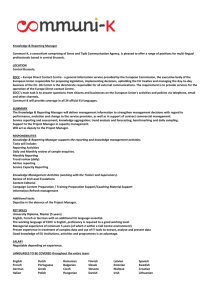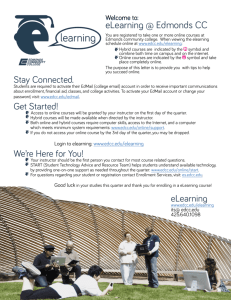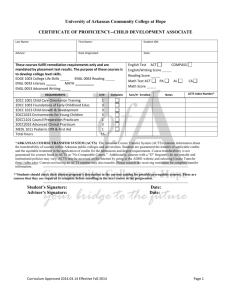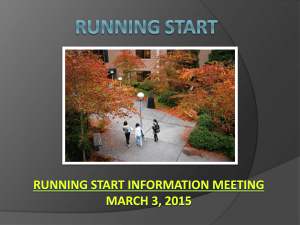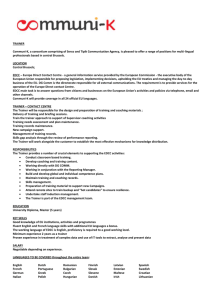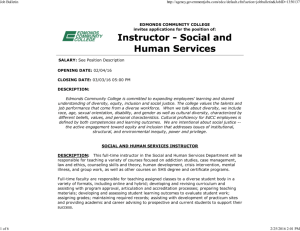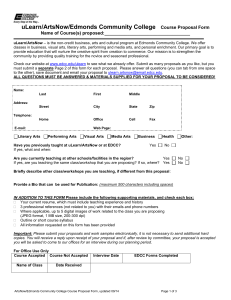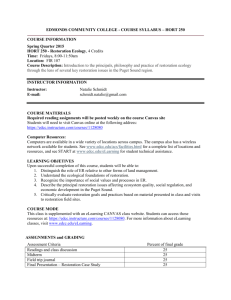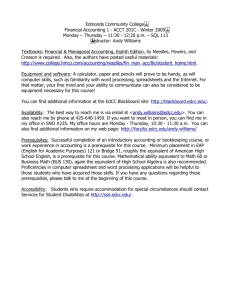HORT 256 INST - Edmonds Community College
advertisement
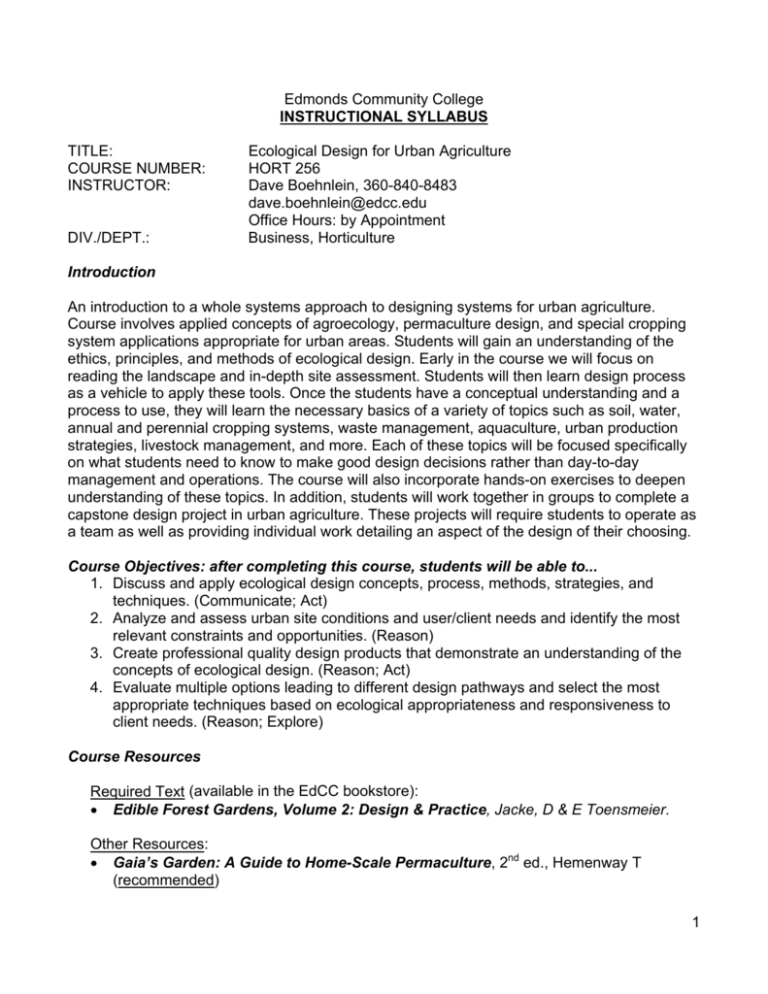
Edmonds Community College INSTRUCTIONAL SYLLABUS TITLE: COURSE NUMBER: INSTRUCTOR: DIV./DEPT.: Ecological Design for Urban Agriculture HORT 256 Dave Boehnlein, 360-840-8483 dave.boehnlein@edcc.edu Office Hours: by Appointment Business, Horticulture Introduction An introduction to a whole systems approach to designing systems for urban agriculture. Course involves applied concepts of agroecology, permaculture design, and special cropping system applications appropriate for urban areas. Students will gain an understanding of the ethics, principles, and methods of ecological design. Early in the course we will focus on reading the landscape and in-depth site assessment. Students will then learn design process as a vehicle to apply these tools. Once the students have a conceptual understanding and a process to use, they will learn the necessary basics of a variety of topics such as soil, water, annual and perennial cropping systems, waste management, aquaculture, urban production strategies, livestock management, and more. Each of these topics will be focused specifically on what students need to know to make good design decisions rather than day-to-day management and operations. The course will also incorporate hands-on exercises to deepen understanding of these topics. In addition, students will work together in groups to complete a capstone design project in urban agriculture. These projects will require students to operate as a team as well as providing individual work detailing an aspect of the design of their choosing. Course Objectives: after completing this course, students will be able to... 1. Discuss and apply ecological design concepts, process, methods, strategies, and techniques. (Communicate; Act) 2. Analyze and assess urban site conditions and user/client needs and identify the most relevant constraints and opportunities. (Reason) 3. Create professional quality design products that demonstrate an understanding of the concepts of ecological design. (Reason; Act) 4. Evaluate multiple options leading to different design pathways and select the most appropriate techniques based on ecological appropriateness and responsiveness to client needs. (Reason; Explore) Course Resources Required Text (available in the EdCC bookstore): • Edible Forest Gardens, Volume 2: Design & Practice, Jacke, D & E Toensmeier. Other Resources: • Gaia’s Garden: A Guide to Home-Scale Permaculture, 2nd ed., Hemenway T (recommended) 1 • • • • • Introduction to Permaculture, 2nd ed., 2002, Mollison B (recommended resource) Permaculture: A Designer’s Manual, 1988, Mollison B (recommended resource) Vertical Vegetable Gardening: A Living Free Guide, 2013, McLaughlin (recommended) Other readings/media resources may be provided as appropriate. Tutors are available at no charge through the Learning Support Center, Tutoring Office in Mukilteo Hall Room 113 or call 425-640-1750. If you are having difficulty at any time, seek out a tutor. Tutor study partners are also very helpful for self-testing. If you require an accommodation for a disability, please contact Services for Students with Disabilities at MLT 159, 425.640.1320 or ssdmail@edcc.edu. Course Mode This class will be supplemented with an eLearning class website. However, as this is a new course this capacity will be getting developed this quarter. Resources may include the following... • Articles • Links to videos • Other reference materials you may find useful. Students will be able to access those resources via Canvas at some point during the quarter. For more information about eLearning classes, visit www.edcc.edu/elearning. Student Technical Support: Contact START at www.edcc.edu/elearning 425.640.1101. 2 Course Schedule (subject to change) 5/12 Small Livestock Pest Management Annuals & Staple Crops Seed Saving Food Processing & Storage Design for Wildlife Hands-on 5/19 Siting & Access Structures & Natural Building Studio Time Soil Fertility & Management Fungi Methods of Design, Pt. 2 Design Process Reading the Landscape 5/26 Holiday; No class 6/2 Energy Systems Appropriate Technology Hands-On 4/28 Water in the Landscape Rainwater Catchment Hands-On 6/9 Aquaculture Aquaponics Wetland Systems Studio Time 5/5 Forest Ecology Perennial Systems Tree Crops Agroforestry Forest Gardening Structural Forests Windbreaks Bamboo Studio Time 6/16 Invisible Structures Finance & Economics Land Access Social Systems Design for Disaster Final Design Presentations 4/7 Course Layout & Expectations Whole Systems Design Permaculture (PC) Ethics PC Design Principles Patterns In Nature 4/14 Climate & Weather Site Analysis & Assessment Scale of Permanence Methods of Design, Pt. 1 Mapping Basics 4/21 TBD Rooftop Systems Vertical Production Systems Policy & Code 3 Course Requirements • • • • Attendance at all classes is required. Punctuality is mandatory. If you must miss a class, email the instructor. Students will be responsible for abilities and information covered in missed classes. Students may be dropped from the class after three (3) absences. Repeated tardiness will affect grades. Students are expected to produce near-professional quality products for presentations. That means drawings will be to scale, writing will be legible & it will be clear that you put time into thinking about layout and presentation. If you would be embarrassed to charge a client for what you have produced, it isn’t high-quality enough. See the instructor if you have questions about your design products before you create them. Due to the holiday on May 26, you will have a class session scheduled on another day. That day will be spent with Zsofia Pastor focusing on rooftop systems, vertical production systems, and legal/code issues. Once scheduled, if you cannot make that session for any reason, an alternative way to get credit for that content will be provided. Since rescheduling for weather isn’t feasible, you need to come to class everyday prepared to go outside (rain or shine). In addition, the class days marked with “Hands-on” projects, you need to come prepared to get dirty. Actual hands-on projects are yet to be determined, but could involve planting trees, composting, or other projects, so you may want to bring a change of clothes (no one will be excused from participation for lack of proper attire). Group Design Project: Students will work in teams to move through the design process presented in class. Together each team will conduct a site analysis & assessment and client interview. With this information you will use design methodologies to produce a permaculture master plan & accompanying documents for your client. Benchmarks will be provided to help you move through the design process in a timely manner. You will need to meet with your design team outside of class to get this project done. Details will be provided on a handout. Individual Design Project: Each student will select an aspect of their group’s master plan and detail it to the best of their ability. This is an opportunity for each student to “go deeper” on an aspect whole systems design that has piqued their interest. This could mean creating a detailed planting plan for an orchard, a blueprint for a building, a design for an electrical energy system, a plan for water harvesting earthworks, etc. Each student can check with the instructor to make sure the detail they have selected is appropriate. Details will be provided on a hand-out. Studio Time: 4 Portions of each class session marked with “Studio Time” will provide time for design teams to work on their projects during class. During this time the instructor will be checking in with each group to make sure they are on the right track. This is the best time to ask questions. Presentation: There is no exam for this course. However, during exam week present the designs you’ve worked on all quarter. You and your design team will have 25 minutes to present the design work you’ve done on both your group and individual projects. Every student must participate in the design presentation. Guidelines will be provided on how you may want to structure this presentation. Class Participation: Students will be assessed on their level of class participation. This ranges from simple attendance at the most basic level to providing leadership during class exercises involving groups of students or the entire class. All students are expected to be actively engaged in any classroom wide or small group activities. See participation grading rubric below. Course Assessment: Students are assessed according to their ability and effort in meeting the requirements of the class and demonstrating that they are active learners. Final grades will be based upon the combination of class attendance and participation & performance on individual & group projects. A final number grade will be ascertained by weighing class elements as follows: 100 ----33 27 40 total points available Participation (3 per class) 1= I showed up on time & did what I was told. 2= I showed up & contributed more than asked for. 3= I showed up & went above & beyond. My instructor learned something from me. Individual Project Group Design Project Statement on Academic Honesty Edmonds CC students shall demonstrate Academic Integrity. I am expected to report all violations of Academic Integrity (cheating and plagiarism) to the College. The College's database of such incidents will be monitored by the Office 5 of the Vice President for Student Services. Data will be maintained for three years. Evidence of repeat incidents will result in additional action by the Office of the Vice President for Student Services as governed by the Student Code of Conduct. In this class, cheating and plagiarism will result in an assignment or grade penalty ranging from (insert minimum penalty here) to (insert maximum penalty here). A second incident in this class will result in an assignment or grade penalty ranging from (insert minimum penalty here—must be at least a zero on the assessment) to (insert maximum penalty here). Student Resources Useful Student Resources:www.edcc.edu/students Academic Calendar:www.edcc.edu/calendar/academic.html Advising:www.edcc.edu/advising Center for Student Engagement and Leadership:www.edcc.edu/csel College Policies and Procedures:http://catalog.edcc.edu Counseling and Resource Center:www.edcc.edu/counseling Diversity Student Center:www.edcc.edu/dsc eLearning Information:www.edcc.edu/elearning Enrollment Services:www.edcc.edu/es Library, including online resources:www.edcc.edu/library Services for Students with Disabilities:www.edcc.edu/ssd Student Printing Information:www.edcc.edu/acs/printing Student Support Resources:www.edcc.edu/support TRIO:www.edcc.edu/trio Emergency Preparedness The Triton Alert System information is here: www.edcc.edu/alert/triton. This System will be used to send notifications regarding campus closures, emergency situations, or evacuation orders in the event of an emergency or inclement weather. Edmonds CC students and employees are automatically enrolled to receive Triton Alerts through their college email addresses. Sign up to receive text and voice messages on your mobile or home phones and/or additional email notifications to personal email addresses. In the event of inclement weather or similar event, communications will happen via the course’s Canvas site. 6
